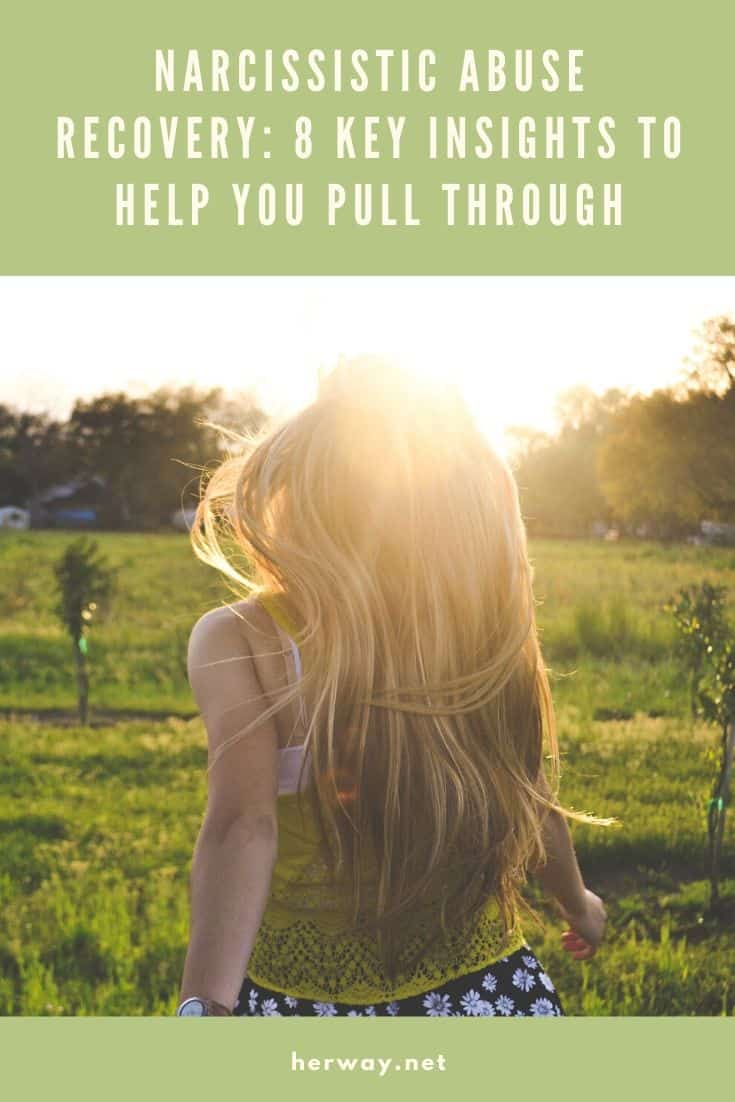Recuperación del abuso narcisista: 8 ideas clave que te ayudarán a salir adelante
Abuso narcisista La recuperación es una de las cosas más complejas por las que uno puede pasar en la vida.
Narcissistic abuse is a severe form of emotional abuse, and unless it’s dealt with on time, it can wreak havoc on a person’s mind and shatter their self-esteem.
During narcissistic abuse recovery, your emotions can range from “I love this person and I can’t fathom a life without them” to “No puedo seguir en esta relación abusiva, ¡aléjenme de este sociópata!” in a matter of seconds.
This is precisely why it’s crucial to put your mental health first and run away at the first sight of a dysfunctional narcissistic relationship.

Como una mujer que ha pasado por el infierno y de vuelta con su ex narcisista, siento que estoy bien equipada para compartir con ustedes mi guía paso a paso sobre el proceso de curación y proporcionarles estas ideas fundamentales sobre el trastorno narcisista de la personalidad.
Desgraciadamente, el maltrato narcisista (también seguido de maltrato psicológico) es algo que comprendo demasiado bien, después de haber pasado por una auténtica montaña rusa.
My recovery process has been shaky, but with the help of a solid support system, I’ve been able to create a new life away from my abusive relationship, and so can you!

I am proud to say that I’ve made full recovery, having found my voice again in an amazing support group, amongst other brave survivors of narcissistic abuse.
I’ve found that once you realize that your self-worth is far more important than a fragile man’s ego, letting go becomes easier.
I’m going to share with you some valuable insights that have helped me find my ground again after a long, treacherous case of narcissistic abuse.
I sincerely hope that this can help you find your true self again while you’re on your much-needed road to recovery.
Véase también: ¿Por qué no encuentro el amor? 10 problemas que te impiden encontrar a tu media naranja
Recuperación del abuso narcisista: Lo que necesita saber

Me complace enormemente informarte de que prosperar tras un abuso narcisista es posible.
Salir de un relación tóxica puede ser un proceso difícil y agotador, pero al final le ayudará a recuperar la confianza en sí mismo y le acercará un paso más a la curación.
As an empath and abuse survivor, I’ve been through an array of complex emotions with my abuser, but I’ve managed to find my way back.
With the help of a narcissistic abuse recovery program and my cherished family members, here’s what I’ve come to discover.
Esperemos que estas ideas le proporcionen la misma tranquilidad y una nueva oportunidad en la vida.
1. Tu pasado puede haberte condicionado a relaciones tóxicas

A menudo, cuando las personas se involucran con individuos tóxicos y entran en una relación abusiva, ésta puede estar relacionada con su pasado.
Your narcissistic parents may have been the reason why you’ve convinced yourself that accepting emotional abuse is okay.
During your youngest years, you are prone to your parents’ and loved ones’ influence the most.
If you’ve been around a narcissistic mother and come from a deeply dysfunctional family, that may have triggered you to keep repeating the toxic cycle.
Tu historial de parejas narcisistas y de estar rodeado de amigos que padecen un trastorno narcisista de la personalidad te ha hecho creer que eso es lo que te mereces.

And do you know why? Because that’s all you’ve ever been shown.
Piense en su infancia y en sus años de formación. ¿Era frecuente el abuso narcisista?
¿Fuiste testigo de abusos emocionales por parte de familiares tóxicos? ¿Alguna vez te enseñaron la importancia del amor propio?
Desarrollar relaciones sanas es vital porque te ayuda a ver tu autoestima y te pone en el buen camino desde el principio.
Think about all the red flags you may have ignored in your past and try to connect it all to your present. You might be surprised at what you’ll discover,
Véase también: 10 diferencias cruciales entre el amor y el enamoramiento
2. La negación puede estar obstaculizando tu proceso de recuperación

Denial is something we’re all familiar with. Sometimes, it’s just easier to lie to yourself than admit how things really are.
If you deeply want to be with someone, you’re going to ignore their red flags and lie to yourself that you’re just overreacting.
If you want to remain in your narcissistic mother’s life, you’ll program yourself to be in denial about her issues.
Un falso sentido de la realidad es lo que la gente crea cuando la idea de la cruda verdad les asusta.
But that eventually comes back to bite you in the ass, because you’re never introduced to the idea of a healthy relationship.

Negar los problemas prolonga tu sufrimiento. Negarse a ver a las personas por lo que son te mete en relaciones abusivas que se llevan un trozo de tu alma día tras día.
El impulso de mentir y culparte por los pecados de tus seres queridos está pisoteando todo tu proceso de recuperación.
It’s self-destructive and counter-productive.
Crea patrones insanos que te llevan a una relación tóxica sin salida. Romper con la negación es un paso crucial en tu curación.
When you’re in a codependent relationship, denying your partner’s deficiencies helps you create a fake reality that you can live in. For as long as you live in constant denial, your recovery will never lead you to salvation.
3. A un narcisista nunca le importarán tus sentimientos

Como empático, ésta ha sido una de las cosas más difíciles de aceptar. Lo cierto es que un narcisista nunca entenderá tu punto de vista.
Nunca podrán conectar contigo como tú quieres y, por mucho que lo intentes, nunca se preocuparán de verdad por tus sentimientos.
To anyone with empathetic tendencies, a narcissist’s inability to feel will forever be incomprehensible. But you have to understand that their narcissistic personality disorder is a permanent impairment that cannot be ”solved” over time.
A narcissist is smooth, charming, deceitful, and extremely capable of getting their desired outcome in any situation. They are so scarily good at lying, that they’ll make you believe they actually have feelings.
But they don’t. Which is why narcissistic abuse comes so naturally to them.

They just don’t care. To them, their actions don’t come with consequences, as that would require having an emotional depth, which they don’t.
Ahórrate la molestia de intentar comunicarte con un narcisista tóxico y decide no tener contacto. Es la única forma de encontrar la paz.
Te mereces un poco de autocuidado y mimos, no luz de gas y rabietas narcisistas.
A un narcisista patológico nunca le importará tu punto de vista, explicaciones o razonamientos a menos que encajen con lo que ellos quieren. Buscan el beneficio personal y el poder, no el amor y la devoción. Aprende la diferencia y déjalos ir.
Véase también: Una colección de preguntas para conocerle mejor y profundizar en sus conocimientos
4. Evitar el dolor prolonga tu sufrimiento

Coming to grips with the reality of your narcissistic abuse and accepting that you’ve been a victim of a narcissistic relationship all this time is a daunting thing, to say the least.
Embracing the pain forces you to admit to yourself the truth you’ve been successfully avoiding all this time.
Como pareja de un novio/novia narcisista, estás de luto por la pérdida de una relación que ha sido la base de tu vida durante una cantidad significativa de tiempo.
Como hijo de padres narcisistas, estás de luto por la pérdida de un padre que nunca te dio realmente la vida que merecías.
All that leads to an array of emotions you’ve been sweeping under the rug for so many years, and now, you are faced with all of them at once. How do you cope with that?

There is no way around grief. Learning to live with the pain you’ve been avoiding for so long takes time.
La recuperación del abuso narcisista es un proceso largo y nadie espera que simplemente superes algo tan traumático en un abrir y cerrar de ojos.
The key to healing is embracing the pain and letting yourself go through the motions. A lot of the time, people try to find shortcuts to happiness but to be honest, there aren’t any.
Siéntate con tu dolor. Reconoce su existencia.
Let it wash over you and cry your tears until there’s nothing left to cry.
Todo este espectro de emociones da miedo, pero si quieres llegar al otro lado, primero tienes que atravesarlo y enfrentarte a tus demonios.
5. Reconocer los efectos de tu trauma ayuda a tu curación

El abuso narcisista es un trauma profundamente perturbador que uno no puede simplemente superar y seguir adelante.
Especialmente si su abuso emocional ha sido continuo.
The emotional abuse you’ve been experiencing is a constant attack on your identity and the silent treatment you’ve been through teaches you that you don’t deserve their attention.
Don’t distance yourself from the traumatic effects this has left on you. Your emotional scars are real.
Tu dolor es real.
What you’ve been through is a major setback that has shifted your entire view on your self-worth.
If you’re struggling with symptoms of anxiety, depression, insomnia, or any type of illness, turn to a support group!
It will help you understand that what you’re going through is part of the process.

Un sistema de apoyo es imprescindible en tiempos como estos.
Lo peor que puedes hacer es aislarte y enfrentarte sola a tu compleja recuperación. ¡Te mereces recuperar tu autoestima!
Te mereces poder entrar en las redes sociales y no derrumbarte después de ver a tu ex narcisista alardeando de su ostentoso estilo de vida del que apenas conseguiste escapar.
Reconoce los efectos que el abuso narcisista ha dejado en ti y trátalos con cuidado y precaución. Lo que te ocurrió no está bien.
Pero tú... puede superarlo y tú se empezar a sentirme normal de nuevo.
Permítase curarse a un ritmo que le permita procesar sus problemas sin sentirse abrumado.
Véase también: Cómo olvidar a alguien: La guía definitiva para seguir adelante
6. Definitivamente lo superarás

Durante tu recuperación del abuso narcisista, a menudo cuestionarás tu capacidad para salir adelante.
Your demons will catch up to you at some point and make you re-evaluate everything you’ve been trying so hard to escape.
Pero déjame contarte un pequeño secreto. Eres mucho más poderoso de lo que crees.
Tu capacidad de curar es casi tan insuperable como tu capacidad de amar tan desinteresadamente.
You will see signs of healing once you get rid of the denial you’ve been living in and accept the actual reality as opposed to the one you’ve created.
Cuando aceptes el hecho de que el narcisismo es prácticamente imposible de curar, dejar ir será tu única opción.
Cuando empieces a dar prioridad a tu salud mental y dejes de consentir a individuos tóxicos, estarás un paso más cerca de tu destino final.

And that’s happiness, acceptance, growth, and self-confidence.
If right now, you don’t feel strong, powerful, and capable, that’s okay.
Todo llega con el tiempo. Pero lo superarás.
Your narcissistic loved one won’t win.
Tu proceso de recuperación puede ser largo, pero también te aportará la tranquilidad que un narcisista nunca podrá tener.
And in that, you can find some solace. When you’re finally at peace, you’ll see that every tear and every heartache was worth it.
7. By educating yourself, you’ll prevent it from happening again

Una de las razones más comunes por las que las personas se dejan enredar con narcisistas es su falta de conocimiento de lo que constituye uno en primer lugar.
Por ejemplo, yo. Antes de mi relación abusiva, nunca fui plenamente consciente de lo profundamente arraigado que está el narcisismo.
Siempre creí que un narcisista era una persona que se hacía demasiados selfies y salía en las redes sociales, mostrando su cuerpo con demasiada frecuencia.
Pero sabiendo lo que sé ahora, ojalá me hubiera informado mejor.
If only I knew how unstable and dangerous narcissistic abuse was, perhaps I could’ve saved myself a long time ago.
Así que ahora te animo a que fortalezcas tu propio yo a través de la educación.
Aprenda qué es el narcisismo y lo perjudicial que puede ser estar cerca de uno.
Si aprendes todo lo que puedas, te ayudarás a ti mismo a reconocer las señales más adelante.

Nunca podrá solucionar un problema si antes no aprende a identificarlo.
When you see that your pain was a byproduct of toxic love, it will make you see that it wasn’t your fault.
Te ayudará a mantenerte alejado de las relaciones narcisistas y a avanzar en la dirección correcta hacia las relaciones sanas.
El conocimiento es poder. Edúcate y asegúrate una vida feliz, plena y libre de tóxicos que sabes que te mereces.
Véase también: 12 razones por las que tu segundo amor es el mejor de todos
8. Deja ir a cualquiera que se interponga en tu recuperación

Here’s the tough truth. Not letting go of people who are in the way of your personal growth will just keep setting you two steps back for each step you take in the right direction!
It’s unhealthy and hazardous for your mental health. Put an end to it and weed out the ones who don’t belong by your side.
A person doesn’t have to put you through emotional and narcissistic abuse for you to realize they’re not good for you.
They can be toxic in an array of other ways, and it’s important that you recognize that.
Culpar a las víctimas es algo común. ¿Alguien te ha hecho pasar por eso?
If so, let them go. Anyone who says that your struggle is your fault doesn’t deserve your closeness.
Anyone who keeps pressuring you to “supéralo ya” and keeps stating that “it wasn’t really that bad, you’re overreacting” es tóxico, perjudicial y debe desaparecer.

Averigüe quién tiene buenas intenciones y quién sólo le sigue la corriente para sus propios fines egoístas.
Durante tu recuperación, serás vulnerable, emocional y frágil. Lo que necesitas es un sistema de apoyo fuerte que nunca te deje flaquear.
Anyone whose presence doesn’t bring you peace, joy, and calm needs to leave your side.
Right now, you’re at a crossroads, so think twice about who stays in your life and who you’re going to say your final goodbye to.
Not everyone deserves to stay in your life, and that’s okay.
Part of the recovery process is knowing who’s got your back and who was never really there for you in the first place.
Véase también: Cómo tratan los narcisistas a sus ex: 12 maneras desvergonzadas
Ya nada puede detenerte.

Después de pasar por todos los pasos de tu recuperación del abuso narcisista, llegarás a la etapa final. Una que te reintroduce a tu nuevo yo.
The person who doesn’t take shit from anybody. A strong, powerful, willful individual who’s been through hell and back and has landed on their feet.
Forgive yourself for all the times you weren’t strong enough to let them go. Forgive yourself for every tearful night you spent wallowing in misery, wondering when this emotional abuse would stop.
Forgive yourself for not knowing the lengths of your narcissist’s evil ways.
Back then, you didn’t know any better, but now, you’re a brand new person who just got a second chance at life.

Y ya nada puede destrozar tu autoestima.
Nadie podría volver a hacerle dudar de su propia fuerza y resistencia.
After surviving your trauma and finding yourself again, you’re a force to be reckoned with.
Deja que te vean brillar. Puede que intenten hacerte daño.
Puede que intenten hacerte caer. Pero ahora sabes que no debes volver a rebajarte a su nivel.
You’re a brave new person who just got their groove back.
And you’ll be damned if you’ll ever let anyone take it from you again!
Véase también: ¿Cuál es el significado del amor? 12 bellas facetas de esta poderosa emoción







